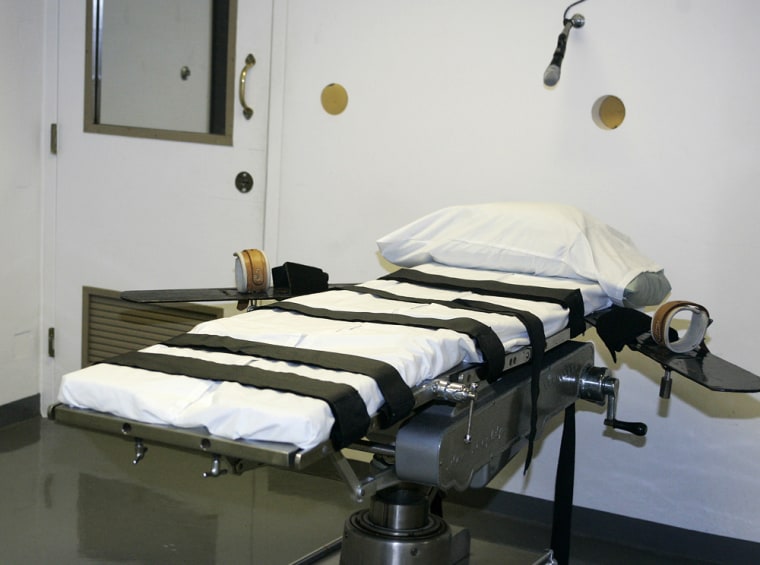Defense attorneys are worried that an innocent man could be executed now that the U.S. death-row machine is gearing up again following a Supreme Court ruling that upheld the constitutionality of lethal injection after an unofficial seven-month moratorium.
They point to past death sentences of men who were later exonerated, blaming ineffective lawyers, overzealous prosecutors and shoddy evidence.
"The answer is yes, it could happen," said James Rowan, who has defended more than 40 capital cases.
Since 1973, 129 people have walked off death row in 26 states after evidence proved they were wrongfully convicted, according to the Death Penalty Information Center.
Florida leads all states with 22 exonerations, followed by 18 in Illinois. Oklahoma is one of five states that have each freed eight inmates from death row. One of the Oklahoma men, Ron Williamson, spent nine years on death row and came within five days of execution before he was set free by DNA evidence. The case formed the basis of John Grisham's best-selling "The Innocent Man."
Oklahoma's executioners have administered lethal injections to 86 people since the death penalty was reinstated in 1976, trailing only Texas with 405 and Virginia with 98.
Court ruling OKs injections
The Supreme Court began considering the constitutionality of lethal injection in September after a Kentucky man sued, arguing the procedure was cruel and unusal punishment.
Critics of the practice say that if the initial anesthetic in the lethal three-drug does not take hold, the other two drugs can cause excruciating pain. One of those drugs, a paralytic, would render the prisoner unable to express his discomfort.
The 35 states that use lethal injections held off until the court upheld the practice in April. The states of Mississippi and Georgia have executed death row inmates since the ruling.
Nobody has ever been able to produce irrefutable proof that any innocent man was executed in recent U.S. history, but Oklahoma's execution of Malcolm Rent Johnson has troubled many death penalty opponents. He went to his execution proclaiming his innocence.
A star prosecution witness against Johnson, convicted of the 1981 rape and strangulation of an elderly woman, was police chemist Joyce Gilchrist, who was later fired amid allegations of shoddy forensic work and misleading testimony.
"There were serious questions about his case," said Vicki Werneke, chief of the capital post-conviction division of the Oklahoma Indigent Defense System. "There was a lot of circumstantial evidence in that case, but he was executed in 2000, right before the whole issue with Joyce Gilchrist came to light."
Attempts to contact Gilchrist for comment were unsuccessful; there is no listed telephone number for her in Oklahoma City.
Current case raises questions
A current case that has raised questions is that of Paris Lapriest Powell, convicted in the 1993 shooting death of a 14-year-old in a gang-related, drive-by shooting in Oklahoma City.
Powell, then 19, and a co-defendant were convicted and sentenced to death based largely on the testimony of prosecution witness Derick Smith, a convicted drug dealer who has since recanted his testimony and said he lied.
A federal judge has ordered a new trial for Powell, now 34. The state has appealed the judge's ruling.
Powell, one of 83 condemned inmates in the "H-unit" of the state penitentiary, has always maintained his innocence.
"I've never really sat back and contemplated my last meal or anything like that. I've refused to accept that," Powell said in a recent interview with The Associated Press.
He describes a sense of community on Oklahoma's death row, where inmates share a common goal of avoiding the nearby death chamber.
"You can't help but to think about it. You always know that it's there," Powell said.
"I don't prefer death at all, but if I have to die ... I'd choose old age."
Punishment only sought in 'sadistic-type' crimes
Both Powell and Johnson were prosecuted by the office of Bob Macy, Oklahoma County's chief prosecutor for more than two decades.
Macy, now 78 and retired, oversaw an office that sent to death row 34 of the 86 inmates who have been executed in Oklahoma since executions resumed in 1990.

While Macy acknowledges that forensic science has advanced greatly in recent years and that appellate courts sometimes criticized his arguments, he said he never sought the death penalty unless he was convinced a defendant was guilty.
"I have always believed the death penalty is a deterrent, and it's one reason I sought the death penalty as often as I did," he said.
"We tried at least 60 capital murder cases, and I think we got the death penalty in 54 of them," he said in a telephone interview. "The only time you get the death penalty is when you have greatly cruel, sadistic-type crime."
